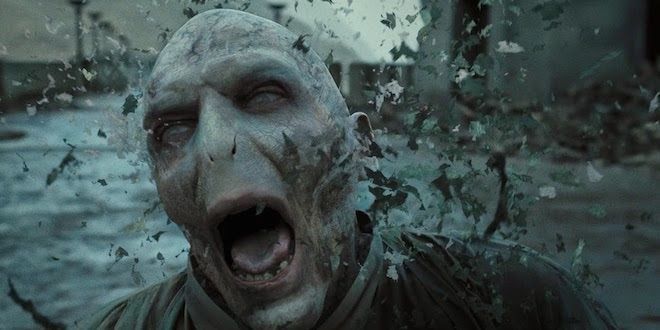Friendship above all
The sacrifice in Harry Potter can be viewed on several levels. The most obvious of them is friendship – a value that is strongly emphasized and promoted in books. It is a relationship that connects all three main characters – Harry, Ron and Hermione, and which has a key impact on the course of events. Already in the first volume of the saga, Harry Potter and the Philosopher’s Stone , the trio become incredibly close to each other, and in the following parts they all prove to each other how loyal they are to the others and how much they care for them. An example of this is the boys’ preoccupation with petrifying Hermione in the Chamber of Secrets and caring Harry and Hermione over wounded Ron in the Prisoner of Azkaban.. Heroes value friendship above all else – they always stick together and know that if they don’t rely on each other, they won’t achieve anything. And it is loyalty that determines their advantage over the enemy and, in effect, victory over him – if it were not for their mutual support, they would probably never have found all of Voldemort’s hokruxes, the destruction of which was necessary to annihilate the Dark Lord.
At the same time, their friendship is often put to the test. This is evident in the Goblet of Fire , where Harry and Ron argue and break contact for a while due to the latter’s usual jealousy of the protagonist’s participation in the Triwizard Tournament. However, it is not just mundane situations that cause confusion. The forces of evil are also trying to turn the familiarity of the heroes to their own advantage. This is the case, for example, in Harry Potter and the Deathly Hallows, where the trio’s too long wearing of Salazar Slytherin’s Medallion, which encapsulates one of Voldemort’s soul fragments, causes Ron to separate from Harry and Hermione and delays the aforementioned mission to destroy all horcruxes. In the end, the heroes overcome all adversities – both trivial and those most threatening to their relationships, and it is this dedication and steadfastness that testifies to the sacrifice they are ready for in the name of friendship.

A philosophy of sacrifice
Of course, in the context of Harry Potteryou can look at sacrifice much more broadly. Its quintessence is the ability to put a higher goal or someone’s good (often the good of the whole) over one’s own. We meet such situations in the series many times and, interestingly, they most often concern the so-called the highest sacrifice, and therefore giving your life for others. During the saga, at least a few people are killed to save Harry – be it in the name of friendship or love. We meet the latter case already in the first part, when it is explained that Harry’s mother, Lily Potter, sacrificed herself precisely because of the love she had for her son (this act not only saved baby Harry from the murderous spell of Voldemort. , but also provided him with a protective aura for many years).Deathly Hallows , where, while helping the main characters to escape from the Malfoy Manor, he is stabbed with a dagger by Bellatrix Lestrange. This is the ultimate proof that Dobby was willing to save the trio no matter what the price might be, solely because he had a special affection for the protagonists (especially Harry himself).
The most significant act of sacrifice, however, concerns the title character. In the same part, he decides, according to Dumbledore’s plan, to give his life in order to be able to destroy the fragment of Voldemort’s soul that is in him and thus directly contribute to the annihilation of the sorcerer. In other words, Harry sacrifices himself not so much for friendship or love for others, but for the higher purpose of restoring order to the wizarding world and finally defeating evil. It is a sacrifice in the literal sense of the word – giving your life for the sake of an idea, without being sure whether it will actually come true. Harry had been given the opportunity to return to the mortal world and see for himself whether it made sense, but the mere fact that he was able to bring himself to do so, testifies to his understanding of the seriousness of the matter and the aforementioned ability to give up one’s own good for the benefit of others, including those closest to him. And this seems to be the best definition of the word “sacrifice.”

Dedication not always good?
The thoughts presented above seem to confirm that we associate the word “sacrifice” rather unequivocally positively. What if you look at them from a different perspective? Could sacrifice have a… dark side? Here’s one more theme to take a closer look at Harry’s nemesis, Lord Voldemort. For the most powerful wizard of all time has also made a sacrifice, but of a kind neither of us should even think about …
Well, the obsession with death discussed in the previous parts of the cycle and focusing all efforts on avoiding it led him to sacrifice the most fundamental part of his personality – his own soul. Tearing apart the essence of his being, piece by piece, Voldemort finally deprived himself of all feelings and humanity, becoming nothing more than a literal monster in human skin, not doing himself any harm to others. All the repercussions of these actions, however, did not matter to him – what mattered was that he managed (or at least he once believed) to escape from death. It ended tragically for him – not only did death finally hit him, but also, as a result of the mutilation of his soul, he was imprisoned for all eternity in the so-called limbo, constituting a specific state of vegetation for the “spirit” – nevertheless, this thread shows how much it was able to sacrifice for, one might say, a mundane goal. This is a kind of warning to ourselves, as Voldemort’s actions prove the consequences of misunderstanding the word “sacrifice,” and what ends up doing it for the wrong ends.

Is it worth the sacrifice?
In view of the above, it turns out that sacrifice can have many faces – both bad and good, moreover, among the good ones, we can distinguish several types of it. JK Rowling’s books teach us which type of sacrifice should be avoided and which should be undertaken. The most important thing is that it results from good motives and values, for which it makes sense to fight. The author even directly glorifies the willingness to sacrifice by making it a desirable feature in Gryffindor – one of the so-called Hogwarts Houses, to which Harry, Ron and Hermione belong. In this way, it makes it clear that it is something extremely important in life – something that we, too, should be capable of, if necessary.


